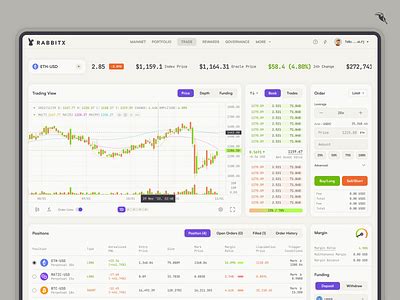- CRYPTOCURRENCY
-
by admin
“Decentralized exchange: the future of trading of cryptocurrencies”
The world of cryptocurrencies trading evolves quickly, the rise in decentralized grants (DEX) offering a safer and transparent means of buying, selling and negotiating cryptocurrencies. Basically, a decentralized exchange is an online platform which allows users to exchange cryptocurrencies without the need for intermediaries such as brokers or exchanges.
In this article, we will immerse ourselves in the concept of decentralized exchanges, their advantages and how they change the face of trading of cryptocurrencies.
What is a decentralized exchange (DEX)?
A decentralized exchange is an online platform that allows users to exchange cryptocurrencies without the need for intermediaries. Unlike traditional exchanges such as Coinbase or Binance, which charge fees for the purchase, sale and detention of cryptocurrencies, DEX completely eliminate these costs. This makes them attractive for people who wish to buy, sell and have cryptocurrencies without incurring unnecessary expenses.
How does a decentralized exchange work?
Dexs works on Blockchain technology, which allows users to create, list and exchange their own cryptocurrency tokens. Here is a simplified overview of its operation:
- Creation of tokens : A Dex is built on a blockchain platform like Ethereum or Binance Smart Chain.
- Listing of tokens

: The Dex lists the new cryptocurrencies for trading, including the possibility of creating and listing personalized tokens.
- Order books : Users can place purchase and sales commands directly with other users in real time, without the need for intermediaries.
- Pricing mechanism : The Dex uses a decentralized pricing mechanism, where prices are determined by market forces rather than central authorities.
Advantages of decentralized exchanges
Dex offer several advantages that traditional exchanges do not do so:
- Higher safety : Dex are more secure due to the use of smart contracts and blockchain technology.
- Lower costs : Without intermediaries, users save on the costs to buy, sell and have cryptocurrencies.
- Transparency
: The decentralized nature of DEX allows greater transparency in prices and commercial activity.
Examples of the real world of decentralized exchanges
Several examples of the real world have already passed to degrees:
- Uniswap (V2) : A popular decentralized exchange was built on Ethereum, which attracted millions of merchants.
- CURVE Finance : A decentralized loan platform that uses a unique algorithmic trading system.
- Aave : Another decentralized loan platform which offers high-efficiency interest rates.
Challenges and limitations
While Dex have many advantages, they also have challenges:
- Regulatory uncertainty : The regulatory environment of DEX is still evolving, and governments have not yet established clear directives.
- Evolution problems : Some degrees are struggling to evolve their trading volumes, which can lead to slower congestion and execution times.
- Complexity of the intelligent contract : Although intelligent contracts are secured by design, they can be complex and difficult to understand.
Conclusion
Decentralized exchanges have revolutionized the world of trading of cryptocurrencies, offering a safer, transparent and profitable means of buying, selling and holding cryptocurrencies. While Dex continue to evolve and mature, we can expect to see even more important improvements in terms of scalability, security and regulatory compliance.
Whether you are a experienced merchant or just start, decentralized scholarships really deserve to explore. With their unique advantages and low costs, Dex have become the essential platform for all those who seek to exchange cryptocurrencies.
